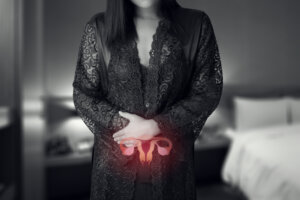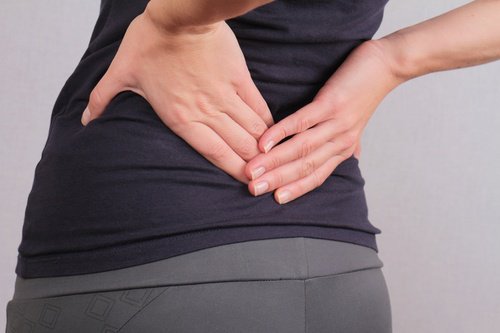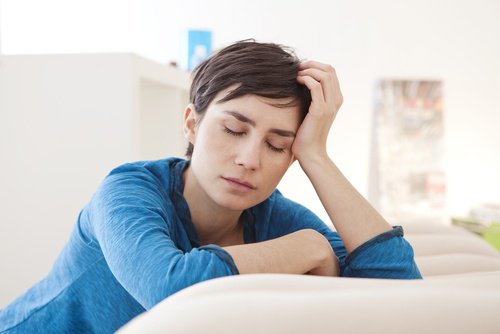9 Warning Signs of Ovarian Cysts Most Women Ignore


Reviewed and approved by the doctor José Gerardo Rosciano Paganelli
Ovarian cysts affect many women throughout their lives, although some never even realize it, according to information from the US National Library of Medicine. Although they don’t initially pose a serious health problem, in some cases they can rupture, increase in size and cause discomfort that many find unbearable.
Cysts are small fluid-filled sacs that are located within or on the surface of the ovaries. Furthermore, they are typically caused by hormonal fluctuations and can develop at any time during your reproductive years.
Although they’re not a serious health problem, it’s important that they be detected in a timely manner to prevent further growth. To do this, it’s best to be aware of any symptoms which can act as an alarm bell, and ensure you get diagnosed. Let’s take a look!
1. Changes in urination

Any change in your urinary habits can be a sign of a number of different health problems. If you suddenly feel the need to urinate or you have difficulty passing urine, bear in mind that it could be due to ovarian cysts, as shown in this study carried out by the Dr Gustavo Aldereguía Lima General University Hospital in Cuba.
These symptoms, as well as a burning sensation after urination, indicate that your pelvic floor muscles are weakened or infected. If the problem persists for more than a couple of days, it’s best to consult your doctor for an early diagnosis.
Read also: 8 things you never knew about menopause
2. Abnormal bleeding
One of the most obvious symptoms of a hormonal problem is bleeding, according to this study carried out by the Virgen del Camino Hospital in Pamplona, Spain. Although it’s common for some women to experience this occasionally, if it’s happening on a regular basis, it’s best to visit your gynecologist.
3. Pain during intercourse

Vaginal infections and inflammation are primary reasons why some women experience pain during sexual intercourse. But if the problem becomes so persistent that it affects your normal sex life, it could indicate the presence of ovarian cysts.
4. Vomiting and nausea
Vomiting and nausea aren’t just symptoms that pregnant women experience. Due to the hormonal imbalances caused by ovarian cysts, some women can also experience these symptoms long-term. This is noted in information by the Mayo Clinic.
5. Abdominal swelling
Abdominal swelling is a symptom that’s often ignored because it’s commonly triggered by other factors. Distention or swelling of the abdominal area is frustrating and can also be accompanied by pain.
If you’re suffering from this swelling on a regular basis and don’t find relief within a few days, it could be a sign of some abnormality in the reproductive system.
6. Pain in the lower back

A feeling of tightness or pain in the lower back doesn’t always indicate that you have a muscle problem. Sometimes the cause requires a deeper assessment, as it could be due to a kidney infection or problems related to the presence of ovarian cysts.
While there is no scientific to prove a connection between lower back pain and ovarian cysts, it’s best to consult with a doctor.
8. Constant fatigue

Stress and a poor diet are the most common factors that trigger bouts of fatigue. However, hormonal imbalances can also give rise to continuous or chronic fatigue. According to this study by the University of San Buenaventura, Cuba, if you feel like you don’t have any energy or you’re having trouble concentrating, you should consider the possibility of ovarian cysts.
Visit this article: The best foods to get rid of fatigue
9. Pelvic pain
Pain in the pelvic region is a very important sign of polycystic ovary syndrome, according to this study conducted by the University of Medical Sciences in Cuba. In fact, it may also be accompanied by changes in your bowel habits and persistent digestive discomfort. If it’s occurring outside of your normal period, it’s a good reason to talk to your doctor.
All of the symptoms we listed above can present in different ways, depending on the individual case. To make sure that they don’t cause any complications, it’s a good idea to keep an eye on them and have a thorough medical exam, just in case.
In addition to that, you can also try a variety of natural remedies that will complement the regular medical treatments for cysts. However, be sure to look into the recommended dosage and contraindications of each one before use.
Some of these include:
All cited sources were thoroughly reviewed by our team to ensure their quality, reliability, currency, and validity. The bibliography of this article was considered reliable and of academic or scientific accuracy.
- Bulun SE. Physiology and pathology of the female reproductive axis. In: Melmed S, Polonsky KS, Larsen PR, Kronenberg HM, eds. Williams Textbook of Endocrinology. 13th ed. Philadelphia, PA: Elsevier; 2016:chap 17.
- Dolan MS, Hill C, Valea FA. Benign gynecologic lesions: vulva, vagina, cervix, uterus, oviduct, ovary, ultrasound imaging of pelvic structures. In: Lobo RA, Gershenson DM, Lentz GM, Valea FA, eds. Comprehensive Gynecology. 7th ed. Philadelphia, PA: Elsevier; 2017:chap 18.
- Bailey C, Ueland F, Land G, Depriest P, Gallion H, Kryscio R, et al. The malignant potential of small cystic ovarian tumors in women over 50 years of age. Gynecol Oncol 1998;69:3-7.
- De Wilde R, Bordt J, Hesseling M. Ovarian cystotomy. Acta Obstet Gynecol Scand 1989;68:363-4.
This text is provided for informational purposes only and does not replace consultation with a professional. If in doubt, consult your specialist.








